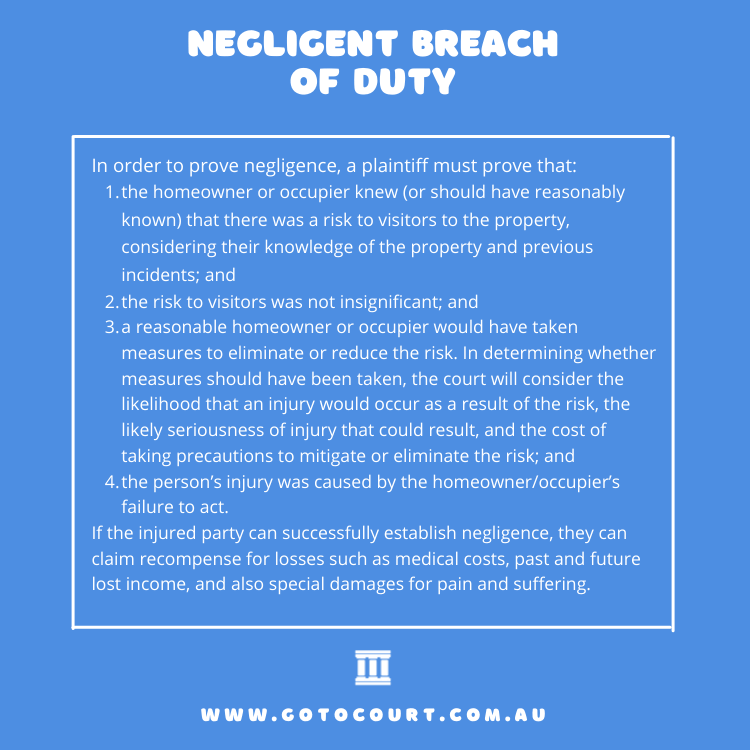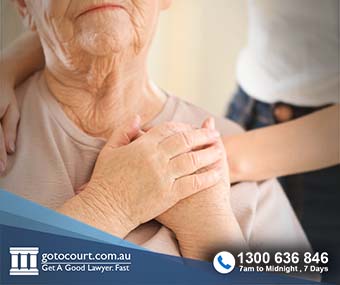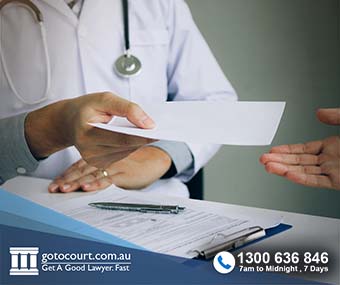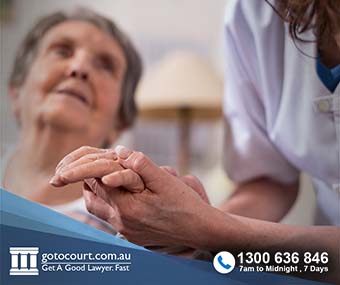Homeowner’s Duty of Care (NSW)
Homeowner’s Duty of Care (NSW)
In New South Wales (NSW), homeowners and occupiers have a legally-recognised duty to make their property safe for visitors. When a homeowner or occupier fails to take reasonable precautions, and a visitor is injured as a result, the visitor can claim compensation for the damages that they incur. This page explores the homeowner/occupier’s duty of care to visitors in New South Wales (NSW).
Duty of care in NSW
In NSW, a homeowner has a duty of care to protect lawful visitors from foreseeable harm. The duty of a homeowner is to maintain their property so that it is as close to hazard-free as reasonably possible. At a minimum, homeowners should perform regular inspections to identify hazards and ensure that qualified tradespeople perform routine repairs.
When a property is leased, both the occupier (tenant) and the homeowner (landlord) share the duty of care to protect visitors from risks. Broadly speaking, the landlord in New South Wales is responsible for the physical fabric of the building. The landlord must ensure the property meets the minimum rental standards mandated in the Residential Tenancies Act 2010. Under this legislation, a landlord must ensure that the leased property provides a habitable residence, with working bathrooms and appliances, which is safe for both the tenant and their visitors. At a minimum, a landlord should quickly action any request for urgent repair that might pose a risk to the tenant or their visitors. The landlord must also ensure that the facilities of the property are safe. For instance, in NSW, a landlord is obliged to build fencing around a swimming pool to prevent children from drowning.
In addition to the duty of care of a landlord, a tenant owes a duty to their visitors. This requires a tenant to maintain the property in a manner that eliminates unreasonable risks. If the tenant is aware of a hazard and does not ask their landlord to address the issue and/or warn their visitors to take care, then the tenant might be liable even if the issue itself falls into the landlord’s area of responsibility.

Negligent breach of duty
When someone is injured on a property, and the homeowner/occupier’s conduct is at fault, then they may be found to be negligent. In New South Wales, the established common law principles of negligence are codified in the Civil Liability Act 2002. It is important to understand that, even if a homeowner/occupier breaches their duty of care, they will only be found to be negligent if someone is injured (or otherwise suffers damage) as a result of the breach of duty.
In order to prove negligence, a plaintiff must prove that:
- the homeowner or occupier knew (or should have reasonably known) that there was a risk to visitors to the property, considering their knowledge of the property and previous incidents; and
- the risk to visitors was not insignificant; and
- a reasonable homeowner or occupier would have taken measures to eliminate or reduce the risk. In determining whether measures should have been taken, the court will consider the likelihood that an injury would occur as a result of the risk, the likely seriousness of injury that could result, and the cost of taking precautions to mitigate or eliminate the risk; and
- the person’s injury was caused by the homeowner/occupier’s failure to act.
If the injured party can successfully establish negligence, they can claim recompense for losses such as medical costs, past and future lost income, and also special damages for pain and suffering.
Homeowner’s duty of care: case study
In recent years, there has been a spate of fatalities and injuries sustained because of the collapse of home balconies. The compensation claims that flowed from these accidents allowed the courts to further define the nature of a homeowner’s duty of care to a visitor.
One such case was heard by the NSW Supreme Court of Appeal in Swift v Wearing-Smith [2016]. In that case, the defendant purchased their home in 2003, at which time a property inspection revealed rust on the supporting structures of the balcony. The report recommended that the rusted structures should be replaced, rust-proofed or repainted; however, the recommendation was not listed in the Issues or Safety Concerns sections of the report. In 2011, a visitor to the property was leaning on the balustrade when it gave way. The visitor sustained serious injuries and brought legal proceedings against the homeowners.
In the first trial in the District Court of NSW, the court found for the plaintiff in the amount of $425,000 on the basis that the homeowners breached their duty of care by failing to repair a balcony that they knew needed repair. The homeowners appealed the judgement, and the Court of Appeal reversed the decision on the basis that the building inspection report did not highlight that the balcony was a safety concern. This case demonstrates that hindsight is not the test of a homeowner’s duty of care. Instead, a court considers how a reasonable homeowner would have acted given the same information. Get in touch with Go To Court Lawyers on 1300 636 846 for any further advice on a homeowner’s duty of care in New South Wales. Our experienced solicitors can give legal advice or represent you on any civil law matter.

Affordable Lawyers
Our Go To Court Lawyers will assist you in all areas of law. We specialise in providing legal advice urgently – at the time when you need it most. If you need a lawyer right now, today, we can help you – no matter where you are in Australia.How It Works




1. You speak directly to a lawyer
When you call the Go To Court Legal Hotline, you will be connected directly to a lawyer, every time.

2. Get your legal situation assessed
We determine the best way forward in your legal matter, free of charge. If you want to go ahead and book a face-to-face appointment, we will connect you with a specialist in your local area.

3. We arrange everything as needed
If you want to go ahead and book a fact-to-face appointment, we will connect you with a specialist in your local area no matter where you are and even at very short notice.





















